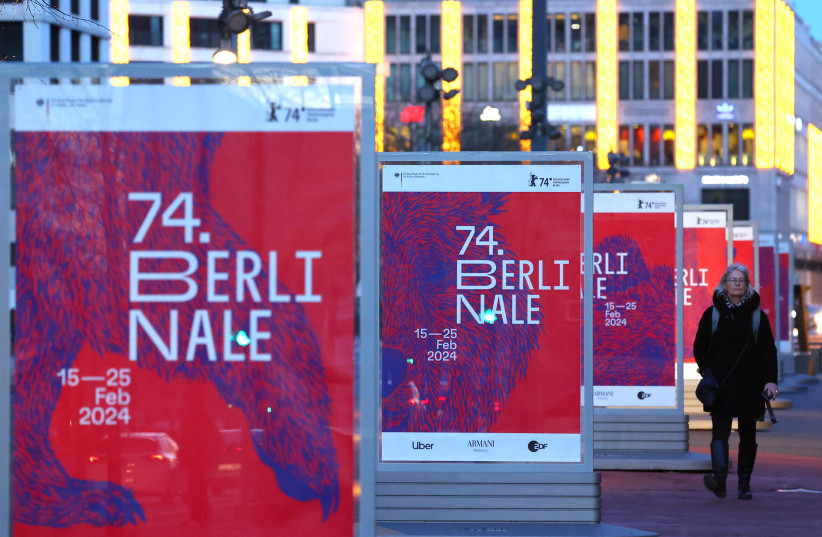“As an architect, I like to construct bridges and not burn them,” said Israeli director Amos Gitai, a trained architect, at the world premiere of his latest movie, Shikun, at the Berlinale, the Berlin International Film Festival, on Sunday afternoon.
Shikun is the only Israeli feature film taking part in the festival, and there were rumors that there would be protests outside the Haus de Berline Festspiele, where the film was shown. There were none. Inside the theater, the audience applauded respectfully, and about 20 even gave the director a standing ovation when he was introduced before the screening.
The film's increasingly relevant message
Shikun, like many of Gitai’s movies, is a multi-character, plotless movie that spotlights vague critiques of the Israeli government and its policy in the West Bank and Gaza. It is inspired by the absurdist Eugene Ionesco's play, Rhinoceros. Throughout, a French-speaking narrator played by Irene Jacob wanders the corridors of a Beersheba housing project and a bus station, uttering portentous words that can be interpreted in a multitude of ways, joined by ultra-Orthodox characters, Holocaust survivors, Arabs, Ukrainian refugees, and greedy building contractors, who also speak in epigrams, a mix not unfamiliar to admirers of the director, who is revered in France more than in Israel.
At a Q&A session following the screening, one man addressed a question to Federal Government Commissioner for Culture and the Media Claudia Roth, who attended the screening, and to Gitai, asking in light of “ongoing genocide” whether Germany should cut off relations with the Netanyahu government. Gitai declined to answer the question, saying, “We will fight to preserve the Israel we love” and that he would do that through dialogue. He did explicitly criticize the government of Prime Minister Benjamin Netanyahu, and he has been an outspoken leftist throughout his 50-year career.
Another man called “Ceasefire, ceasefire now,” and an audience member instantly responded, “Bring the hostages back now.” But despite several audience comments about a ceasefire, Gitai and the members of his cast who attended the screening, among them Menashe Noy and Hanna Laslo, were received warmly. The festival’s artistic director, Carlo Chatrian, introduced the film and its director, a mark of the festival’s respect.
The Berlinale is the first major European film festival that has taken place since Hamas massacred over 1,200 in Israel on October 7 and took 240 hostage, and Israel responded by waging war against Hamas in Gaza.
Berlinale's history of politically conscious films
The Berlinale, known for politically engaged cinema, has welcomed Israeli films since World War II, and many have won top prizes, including Nadav Lapid’s Synonyms in 2019. Chatrian and Berlinale co-director Mariette Rissenbeek (who served on a jury at the Haifa International Film Festival in October) have addressed the issues raised by the war but refused calls to ban Israeli films or creators from the festival.

In a statement they released ahead of the festival, they said, “We believe that through the power of films and open discussions, we can help foster empathy, awareness, understanding – even and especially in painful times like these. Our sympathy goes out to all the victims of the humanitarian crises in the Middle East and elsewhere."
“We want everyone’s suffering to be recognized and for our program to be open to discussing different perspectives on the complexity of the world.” They also established a space at the festival staffed by an Arab and a Jew to encourage dialogue about the Hamas war.
Festival staff criticize Gitai
But some, including Berlinale staff members, criticized the directors’ stance. More than 50 Berlinale workers signed an open letter earlier this month demanding a ceasefire in Gaza and demanding that the festival leadership take a “stronger institutional stance” on the war.
In January, Canadian video artist John Greyson, Indian-American filmmaker Suneil Sanzgiri, and Ayo Tsalithaba, a visual artist from Ghana and Lesotho, withdrew their works from the Berlinale’s Forum Expanded section.
Chatrian noted in an interview with Variety that, in addition to Shikun, the Berlinale was showing No Other Land, a documentary by Yuval Abraham, Basel Adra, and Hamdan Ballal about the Israeli army in the West Bank and an alliance that develops between an Israeli journalist and a Palestinian activist.
Chatrian said that he understood if some filmmakers did not want to take part in the Berlinale but emphasized that, “We still believe that the festival is a great place for dialogue, and we want to keep it as a place for dialogue.”
In the opening-night ceremony, many called for a ceasefire, and others for the release of the hostages held by Hamas. Rissenbeek was applauded when she said,” Hate is not on our guest list.”
Members of the far-right German AfD Party were initially invited to the opening night and, following protests, were disinvited. “By disinviting the AfD, the Berlinale has clearly positioned itself against the right-wing extremism in Germany,” the festival said in a statement.
“Shikun” will be released in Israel and around the world later this year.
